|
|
|
Sort Order |
|
|
|
Items / Page
|
|
|
|
|
|
|
| Srl | Item |
| 1 |
ID:
131516
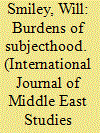

|
|
|
|
|
| Publication |
2014.
|
| Summary/Abstract |
This article analyzes the changing treaty law and practice governing the Ottoman state's attitude toward the subjects of its most important neighbor and most inveterate rival: the Russian Empire. The two empires were linked by both migration and unfreedom; alongside Russian slaves forcibly brought to the sultans' domains, many others came as fugitives from serfdom and conscription. But beginning in the late 18th century, the Ottoman Empire reinforced Russian serfdom and conscription by agreeing to return fugitives, even as the same treaties undermined Ottoman forced labor by mandating the return of Russian slaves. Drawing extensively on Ottoman archival sources, this article argues that the resulting interimperial regulations on unfreedom and movement hardened the empires' human and geographic boundaries, so that for many Russian subjects, foreign subjecthood under treaty law was not a privilege, but a liability.
|
|
|
|
|
|
|
|
|
|
|
|
|
|
|
|
| 2 |
ID:
128250
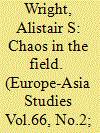

|
|
|
|
|
| Publication |
2014.
|
| Summary/Abstract |
This article traces the creation, experiences and success of Karelia's food supply detachments during the Russian Civil War and focuses on three target provinces: Kursk, Simbirsk and Saratov. It emphasises the early political and economic stumbling blocks faced by the Bolsheviks in their attempts to implement the party's food supply policies in the periphery and indicates that, although the Soviet food supply system by mid-1919 was more centralised and resistance from local soviets lessened, improvements were only relative to the more chaotic conditions of the previous year.
|
|
|
|
|
|
|
|
|
|
|
|
|
|
|
|
| 3 |
ID:
132706
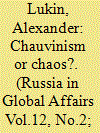

|
|
|
|
|
| Publication |
2014.
|
| Summary/Abstract |
Instead of chauvinism and chaos Russia needs a third alternative. And that is a combination of moderate patriotism and moderate liberalism manifesting itself in the commitment to freer life by law, without corruption, but with mature self-government.
|
|
|
|
|
|
|
|
|
|
|
|
|
|
|
|
| 4 |
ID:
124312
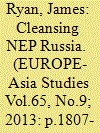

|
|
|
|
|
| Publication |
2013.
|
| Summary/Abstract |
This essay offers a case study of how the Bolshevik state reacted to popular, sometimes violent, opposition and resistance to its policies during the early period of New Economic Policy. The case study concerns the ruling Bolshevik Party's repressive approach to the Russian Orthodox Church in 1922. This culminated in show trials and executions of clergy and lay believers in response to resistance throughout the country to the state's campaign of collecting church valuables that year, ostensibly to provide relief for victims of a catastrophic famine that afflicted much of southern Russia in 1921-1922.
|
|
|
|
|
|
|
|
|
|
|
|
|
|
|
|
| 5 |
ID:
132711
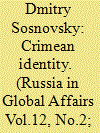

|
|
|
|
|
| Publication |
2014.
|
| Summary/Abstract |
Kiev's attempt to build an all-Ukrainian identity solely on the basis of the Ukrainian ethnos through political centralization, cultural unification, and forceful assimilation was a complete failure. Now, as part of the Russian Federation, which pursues an entirely different regional policy, Crimea has an opportunity to form its own regional identity.
|
|
|
|
|
|
|
|
|
|
|
|
|
|
|
|
| 6 |
ID:
124310
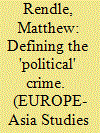

|
|
|
|
|
| Publication |
2013.
|
| Summary/Abstract |
After the October Revolution, the Bolsheviks established revolutionary tribunals to judge 'counter-revolutionary' and 'political' crimes. Amid conflicting reports from contemporaries on the effectiveness of these new courts, this essay examines their development over the first year of their existence. It argues that whilst tribunals were initially too inefficient for the regime, forcing greater central control over them, they played an important role in defining what constituted counter-revolution. In doing so, they promoted the regime's ideology, imparted an image of legality to the regime's actions, and helped the Bolsheviks to exert their control over a fragmented and diverse political landscape.
|
|
|
|
|
|
|
|
|
|
|
|
|
|
|
|
| 7 |
ID:
124352
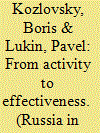

|
|
|
|
|
| Publication |
2012.
|
| Summary/Abstract |
Some four years ago, an author wrote in this journal that the conflict with Georgia would be a watershed that would put an end to Moscow's post-Soviet approach to the world. He believed Russia would finally formulate "a program of realistic and pragmatic foreign policy matching its genuine strategic interests and the goals of economic and social development" (Alexander Lukin, "From a Post-Soviet to a Russian Foreign Policy."
|
|
|
|
|
|
|
|
|
|
|
|
|
|
|
|
| 8 |
ID:
001642
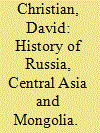

|
|
|
|
|
| Publication |
Oxford, Blackwell Publishers, 1998.
|
| Description |
xxiii, 470p.: plates, figures, maps, table.Hbk
|
| Series |
Blackwell History of the World (HOTW)
|
| Contents |
V.I: Inner Eurasia from prehistory to the Mongol empire
|
| Standard Number |
0631183213
|
|
|
|
|
|
|
|
|
|
|
|
Copies: C:1/I:0,R:0,Q:0
Circulation
| Accession# | Call# | Current Location | Status | Policy | Location |
| 041258 | 947/CHR 041258 | Main | On Shelf | General | |
|
|
|
|
| 9 |
ID:
130894
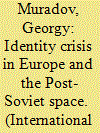

|
|
|
|
|
| Publication |
2014.
|
| Summary/Abstract |
ONLY YEARS LATER does it become evident to politicians and scholars at home and abroad that the fragmentation of historical Russia and the concomitant threat of disintegration facing one of the world's backbone civilization alliances that have been around for several centuries in Eastern Europe and Northern Asia was not a local development of the 90s of the last century, not the collapse of a state that was shortlived by historical standards and known as the Soviet Union, but only the beginning of an extremely dangerous tectonic process of the remaking of the world order.
|
|
|
|
|
|
|
|
|
|
|
|
|
|
|
|
| 10 |
ID:
124303
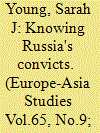

|
|
|
|
|
| Publication |
2013.
|
| Summary/Abstract |
The essay explores the significance of questions of knowledge to the depiction of prisoners in three prominent katorga narratives from the second half of the nineteenth century: Dostoevskii's Notes from the House of the Dead, Kennan's Siberia and the Exile System, and Chekhov's Sakhalin Island. Comparing the different discourses of unknowability these authors employ, it argues that the relationship of the writers or narrators to the outcast status of the convicts takes their texts beyond the immediate context, to shape views of the penal system as expressing the increasing instability of identity, social hierarchies and moral life in Russia.
|
|
|
|
|
|
|
|
|
|
|
|
|
|
|
|
| 11 |
ID:
005719
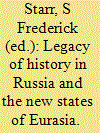

|
|
|
|
|
| Publication |
New York, M E Sharpe, 1994.
|
| Description |
xiii, 313p.Hbk
|
| Series |
International Politics of Eurasia
|
| Contents |
Vol. I
|
| Standard Number |
1563243520
|
|
|
|
|
|
|
|
|
|
|
|
Copies: C:1/I:0,R:0,Q:0
Circulation
| Accession# | Call# | Current Location | Status | Policy | Location |
| 036826 | 947/STA 036826 | Main | On Shelf | General | |
|
|
|
|
| 12 |
ID:
000649
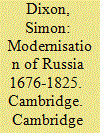

|
|
|
|
|
| Publication |
Cambridge, Cambridge University Press, 1999.
|
| Description |
xvii, 267p.Hbk
|
| Series |
New Approaches to European History
|
| Standard Number |
0521371007
|
|
|
|
|
|
|
|
|
|
|
|
Copies: C:1/I:0,R:0,Q:0
Circulation
| Accession# | Call# | Current Location | Status | Policy | Location |
| 042035 | 947/DIX 042035 | Main | On Shelf | General | |
|
|
|
|
| 13 |
ID:
132697
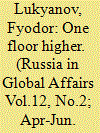

|
|
|
|
|
| Publication |
2014.
|
| Summary/Abstract |
It is already becoming habitual: yet another turn in world politics - and a fondly prepared portfolio of materials has to be shelved, and new ones made in an emergency mode. Witnessing epoch-making events is fascinating, but it takes a lot of nerve…
The period from February to April 2014 marked the sharpest turn in history since the end of the Cold War. We have witnessed the actual collapse of the Ukrainian statehood which emerged after the abolition of the Soviet Union, Crimea's entry into the Russian Federation, and an upsurge in confrontation between Moscow and the West. No wonder life made us revise our plans and devote the entire issue of Russia in Global Affairs to the changes which someone has already dubbed "Russian spring."
|
|
|
|
|
|
|
|
|
|
|
|
|
|
|
|
| 14 |
ID:
128247
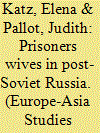

|
|
|
|
|
| Publication |
2014.
|
| Summary/Abstract |
The identity of a prisoner's wife is often a shameful societal stigma. Yet Russia's unique history of imprisonment has provided an unusually positive trope for women who have to come to terms with their partners' incarceration: the 'Decembrist wife' (dekabristka). This trope originated in the aftermath of the 1825 'Decembrist' uprising-the first anti-monarchist revolt in modern Russian history. A handful of wives of the perpetrators voluntarily joined their husbands in Siberian exile and, in leaving behind families and comforts, created a precedent to be glorified for future generations. Upheld in Russian national mythology as a model of the exemplary wife, the dekabristka identity lives on. This paper examines its enduring power and significance in contemporary Russia
|
|
|
|
|
|
|
|
|
|
|
|
|
|
|
|
| 15 |
ID:
124313
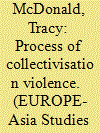

|
|
|
|
|
| Publication |
2013.
|
| Summary/Abstract |
This article attempts to conceptualise violence, and to determine the value of that concept as a lens through which to understand the Soviet collectivisation drive and its legacy. The central claim is that objective violence, the very real experience of the collectivisation drive, becomes subjective violence as it is internalised over time. In the context of the process of collectivisation violence, the lines between victims and perpetrators were blurred in important ways. The end of the Soviet Union triggered a re-evaluation of the meaning of that violence which is still in a state of flux today.
|
|
|
|
|
|
|
|
|
|
|
|
|
|
|
|
| 16 |
ID:
000644
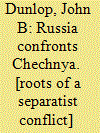

|
|
|
|
|
| Publication |
Cambridge, Univ. Pr., 1998.
|
| Description |
xx, 234p.: maps.hbk
|
| Standard Number |
052163184X
|
|
|
|
|
|
|
|
|
|
|
|
Copies: C:1/I:0,R:0,Q:0
Circulation
| Accession# | Call# | Current Location | Status | Policy | Location |
| 042032 | 947.97/DUN 042032 | Main | On Shelf | General | |
|
|
|
|
| 17 |
ID:
002795
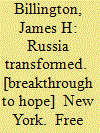

|
|
|
|
|
| Publication |
New York, Free Press, 1992.
|
| Description |
vi, 202p.
|
| Standard Number |
0029035155
|
|
|
|
|
|
|
|
|
|
|
|
Copies: C:1/I:0,R:0,Q:0
Circulation
| Accession# | Call# | Current Location | Status | Policy | Location |
| 034306 | 320.947/BIL 034306 | Main | On Shelf | General | |
|
|
|
|
| 18 |
ID:
006388
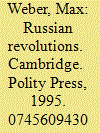

|
|
|
|
|
| Publication |
Cambridge, Polity Press, 1995.
|
| Description |
281p.Hbk
|
| Standard Number |
0745609430
|
|
|
|
|
|
|
|
|
|
|
|
Copies: C:1/I:0,R:0,Q:0
Circulation
| Accession# | Call# | Current Location | Status | Policy | Location |
| 038041 | 947.083/WEB 038041 | Main | On Shelf | General | |
|
|
|
|
| 19 |
ID:
130023
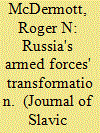

|
|
|
|
|
| Publication |
2014.
|
| Summary/Abstract |
Since the creation of the Armed Forces of the Russian Federation in 1992, the Kremlin has grappled, struggled or even procrastinated on addressing the question of what type of force structure may best suit the state's security environment. A number of initiatives frequently represented as 'reform' have come and gone, falling by the wayside due to internal inertia, institutional resistance to root and branch reform or, indeed, as a result of the political-military elite failing to come to terms with the disintegration of the Soviet Union. Transitioning from the Soviet legacy force to something more akin to the forces needed to protect the Russian state and adapt to the modern warfare environment to meet a number of differing challenges ranging from counterinsurgency to peacekeeping or dealing with an unforeseen military crisis plagued Moscow's defense planning.
|
|
|
|
|
|
|
|
|
|
|
|
|
|
|
|
| 20 |
ID:
124309
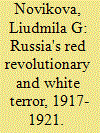

|
|
|
|
|
| Publication |
2013.
|
| Summary/Abstract |
This essay re-examines White and Red terror during the Russian Civil War by studying public participation in the acts of political violence. It shifts attention from the ideological and political motifs of terror to places and contexts where violence occurred. On the example of paramilitary groups of White and Red partisans in Arkhangel'sk province in the Russian North, it demonstrates how local factors, such as the nearby frontline, poor economic conditions or traditional enmity between neighbouring communities, contributed to the escalation of terror at a grass-root level.
|
|
|
|
|
|
|
|
|
|
|
|
|
|
|
|
|
|
|
|
|